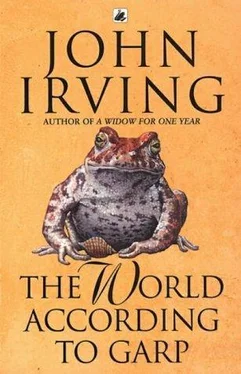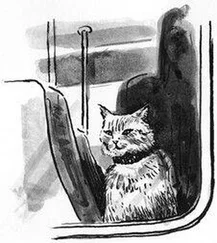But it was actually more than merely wanting a second child that prompted Garp to reproduce again. He knew he was an overwatchful, worrisome father and he felt he might relieve Duncan of some of the pressure of fatherly fears if there was another child to absorb some of Garp's excess anxiety.
“I'm very happy,” Helen told him. “If you want another baby, we'll make one. I just wish you'd relax , I wish you'd be happier. You wrote a good book, now you'll write another one. Isn't it just what you always wanted?”
But he bitched about the reviews of Procrastination , and he moaned about the sales. He carped at his mother, and roared about her “sycophantic friends.” Finally Helen said to him, “You want too much. Too much unqualified praise, or love—or something that's unqualified, anyway. You want the world to say, “I love your writing, I love you,” and that's too much to want. That's really sick, in fact.”
“That's what you said,” he reminded her, “I love your writing, I love you.” That's exactly what you said.”
“But there can only be one of me,” Helen reminded him.
Indeed, there would only be one of her, and he loved her very much. He would always call her “the wisest of my life's decisions.” He made some unwise decisions, he would admit; but in the first five years of his marriage to Helen, he was unfaithful to her only once—and it was brief.
It was a baby-sitter from the college where Helen taught, a freshman girl from Helen's Freshman English class; she was nice with Duncan, though Helen said that the girl was not a very special student. Her name was Cindy; she had read Garp's Procrastination , and she'd been properly awed. When he drove her home, she would ask him one question after another about his writing: How did you think of THAT? and what made you do it THIS way? She was a tiny thing, all flutters and twitches and coos—as trusting, as constant, and as stupid as a Steering pigeon. “Little Squab Bones,” Helen called her, but Garp was attracted; he called her nothing. The Percy family had given him a permanent dislike of nicknames. And he liked Cindy's questions.
Cindy was dropping out of school because she felt a women's college was not right for her; she needed to live with grownups, and with men, she said, and although the college allowed her to move off-campus—into her own apartment, in the second semester of her freshman year—still she felt the college was too “restricted” and she wanted to live in a “more real environment.” She imagined that Garp's Vienna had been a “more real environment,” though Garp struggled to assure her that it had not been. Little Squab Bones, Garp thought, was puppy-brained, and as soft and as easily influenced as a banana. But he wanted her, he realized, and he saw her as simply available—like the whores on the Kдrntnerstrasse, she would be there when he asked her. And she would cost him only lies.
Helen read him a review from a famous news magazine; the review called Procrastination “a complex and moving novel with sharp historic resonances...the drama encompasses the longings and agonies of youth.”
“Oh fuck “the longings and agonies of youth,"” Garp said. One of those youthful longings was embarrassing him now.
As for the “drama": in the first five years of his marriage to Helen, T. S. Garp experienced only one real-life drama, and it did not have that much to do with him.
Garp had been running in the city park when he found the girl, a naked ten-year-old running ahead of him on the bridle path. When she realized he was gaining on her, she fell down and covered her face, then covered her crotch, then tried to hide her insubstantial breasts. It was a cold day, late fall, and Garp saw the blood on the child's thighs and her frightened, swollen eyes. She screamed and screamed at him.
“What happened to you?” he asked, though he knew very well. He looked all around them, but there was no one there. She hugged her raw knees to her chest and screamed. “I won't hurt you,” Garp said. “I want to help you.” But the child wailed even louder. My God, of course! Garp thought: the terrible molester had probably said those very words to her, not long ago. “Where did he go?” Garp asked her. Then he changed his tone, trying to convince her he was on her side. “I'll kill him for you,” he told her. She stared quietly at him, her head shaking and shaking, her fingers pinching and pinching the tight skin on her arms. “Please,” Garp said, “can you tell me where your clothes are?” He had nothing to give her to wear except his sweaty T-shirt. He was dressed in his running shorts, his running shoes. He pulled his T-shirt off over his head and felt instantly cold; the girl cried out, awfully loud, and hid her face. “No, don't be frightened, it's for you to put on,” Garp told her. He let the T-shirt drop on her but she writhed out from under it and kicked at it; then she opened her mouth very wide and bit her own fist.
“She was not old enough to be Boy or Girl yet,” Garp, wrote. “Only in the pudginess around her nipples was there anything faintly girlish. There was certainly no visible sex about her hairless pudenda, and she had a child's sexless hands. Perhaps there was something sensual about her mouth—her lips were puffy—but she had not done that to herself.”
Garp began to cry. The sky was gray, dead leaves were all around them, and when Garp began to wail aloud, the girl picked up his T-shirt and covered herself with it. They were in this queer position to each other—the child crouched under Garp's T-shirt, cringing at Garp's feet with Garp crying over her—when the mounted park police, a twosome, rode up the bridle path and spotted the apparent child molester with his victim. Garp wrote that one of the policemen split the girl and Garp apart by steering his horse between them, “nearly trampling the girl.” The other policeman brought his billy down on Garp's collarbone; one side of his body, he wrote, felt paralyzed—"but not the other.” With “the other” Garp unseated the policeman and tipped him from the saddle. “It's not me , you son of a bitch!” Garp howled. “I just found her, just here—just a minute ago.”
The policeman, sprawled in the leaves, held his drawn gun very still. The other policeman, mounted and prancing, shouted to the girl. “Is it him ?” he yelled. The child seemed terrified of the horses. She stared back and forth from the horses to Garp. She probably isn't sure what happened , Garp thought—much less who. But the girl, violently, shook her head. “Where'd he go?” said the policeman on his horse. But the girl still looked at Garp. She tugged her chin and rubbed her cheeks—she tried to talk to him with her hands. Apparently, her words were gone; or her tongue, Garp thought, recalling Ellen James.
“It's the beard ,” said the cop in the leaves; he had gotten to his feet but he had not holstered his gun. “She's telling us there was a beard,” Garp had a beard then.
“It was someone with a beard,” said Garp. “Like mine ?” he asked the girl, stroking his dark, round beard, glossy with sweat. But she shook her head and ran her fingers over her sore upper lip.
“A mustache!” cried Garp, and the girl nodded.
She pointed back the way Garp had come, but Garp remembered seeing no one near the entrance to the park. The policeman hunched on his horse and through the thrown leaves he rode away from them. The other policeman was calming his horse, but he had not remounted. “Cover her, or find her clothes,” Garp said to him; he started to run down the bridle path after the first policeman; he knew there were things you could see from ground level that you couldn't see on a horse. Also, Garp was such a fool about his running that he imagined he could outlast, if not outrun, any horse.
Читать дальше












